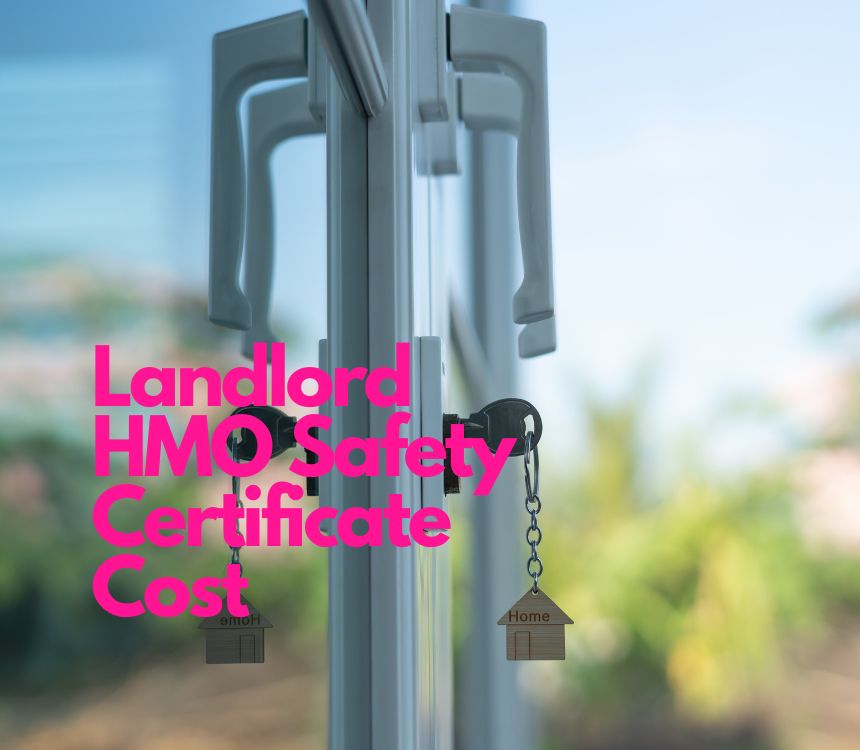For landlords renting out Houses in Multiple Occupation (HMO) in the UK, complying with safety regulations is crucial. Not only does it protect tenants, but it also shields landlords from potential fines and penalties. A common question among HMO landlords is, “How much does an HMO safety certificate cost?” This article breaks down the essential safety certificates needed, their costs, and why they matter.
Understanding HMO Requirements
An HMO is any rental property with at least three tenants from different households sharing common spaces. HMOs are subject to strict safety regulations, primarily due to the shared facilities and increased number of occupants. These certificates ensure that landlords provide a safe and compliant environment for tenants.
Get The Landlord’ HMO Safety Certificates
Stay Fully Compliant – Book Your Annual HMO Certification with Us!
Key Safety Certificates for HMO Properties and Their Costs
Here’s a comprehensive look at the essential safety certificates required for HMO properties in the UK, including average costs for each.
Gas Safety Certificate (CP12)
The Gas Safety Certificate, or CP12, verifies that all gas appliances and installations in the property are safe. A qualified Gas Safe registered engineer must carry out this inspection annually.
- Cost: £85–£120, depending on the property size and location.
- Frequency: Required annually.
Electrical Installation Condition Report (EICR)
The Electrical Installation Condition Report (EICR) assesses the safety of electrical systems in the property. A qualified electrician inspects for faults or potential hazards.
- Cost: £120–£300, with higher costs for larger properties.
- Frequency: Every 5 years or at the start of a new tenancy.
Fire Safety Risk Assessment
An HMO must have a fire safety risk assessment, although this does not come with a specific certificate. Landlords must identify fire risks and ensure adequate safety measures, such as fire alarms, extinguishers, and emergency lighting.
- Cost: £150–£600, based on the property’s size and layout. Additional equipment may add to this cost.
- Frequency: Annually, or whenever significant changes are made to the property.
Smoke Alarm Certificate
Smoke alarms are a legal requirement in HMOs, with specific guidelines around installation and maintenance. Though a certificate isn’t legally mandated, many local councils or insurance providers require proof of regular testing and maintenance.
- Cost: £80–£200 for installation and certification; may vary depending on the alarm type and number required.
- Frequency: Testing and maintenance are recommended yearly or whenever a new tenant moves in.
Carbon Monoxide (CO) Alarm Certificate
CO alarms are essential for properties with solid fuel-burning appliances and are increasingly required for all rental properties, regardless of fuel type. While not mandated as a certificate, having documented testing and maintenance can be helpful for compliance.
- Cost: £65–£90, depending on the number of CO alarms needed and any installation fees.
- Frequency: Testing annually or at tenant turnover is advisable.
Legionella Risk Assessment
The Legionella risk assessment identifies and manages the risk of Legionella bacteria in the water systems, which can cause Legionnaires’ disease. Though not all properties require a formal assessment, HMOs are advised to have one due to shared water facilities.
- Cost: £120–£400, depending on the property’s complexity and the company performing the assessment.
- Frequency: Generally required every two years, but some local councils may require it annually.
PAT Testing (Portable Appliance Testing)
If you provide appliances in the HMO, PAT testing ensures their safety. Each appliance is inspected to confirm it’s safe for tenant use.
- Cost: £5–£10 per appliance, with minimum call-out fees around £85.
- Frequency: Recommended annually, particularly for high-risk appliances.
Energy Performance Certificate (EPC)
An EPC rates the property’s energy efficiency. It’s legally required for all rental properties, including HMOs, and offers tenants information on potential energy costs.
Cost: £65–£150, depending on the property and assessor.
Frequency: Valid for 10 years.
Additional Costs for HMO Compliance
Beyond certificates, landlords should budget for the cost of HMO licensing, which varies by council and ranges from £500 to £1,500. The initial setup of safety features like fire doors, smoke alarms, and CO alarms might also require additional investment.

Why Compliance Matters
Failure to secure these certificates can result in fines, imprisonment, and loss of the right to rent out the property. Ensuring compliance gives landlords peace of mind and ensures tenant safety, fostering a good relationship with local authorities.
Budgeting for HMO Safety Certificate Costs
Because most of these certificates require annual renewal, setting aside a yearly budget for HMO compliance is wise. Many landlords work with HMO management firms or letting agents, who often provide comprehensive safety services, helping streamline compliance at a potentially lower cost.
Getting the HMO Landlord Certificates
In Closing
The cost of HMO safety certificates in the UK depends on factors like property size, location, and certificate type. Most landlords should anticipate spending between £500 and £1,200 annually on safety certifications. Staying up-to-date with these safety measures is not only a legal obligation but a sound investment in your property’s value and tenant satisfaction.
Further Reading
How to Get the Fire Safety Certificate for an HMO
HMO Electrical Requirements: A Comprehensive Guide for Landlords